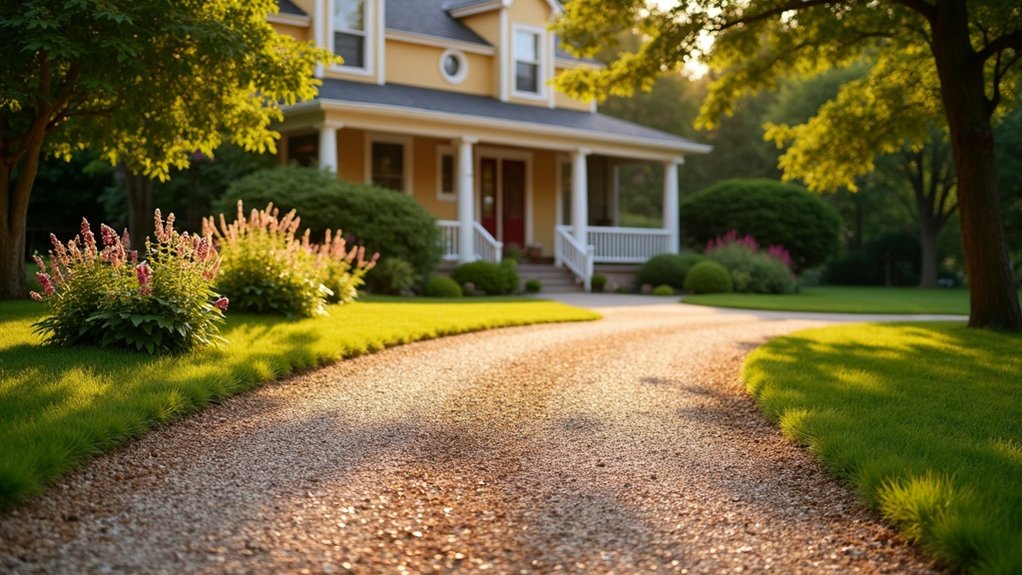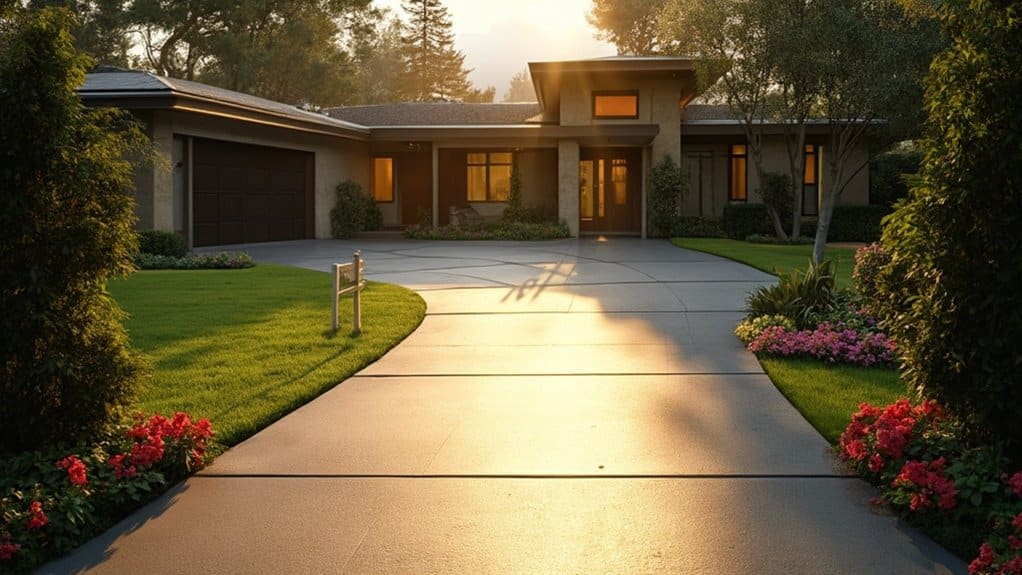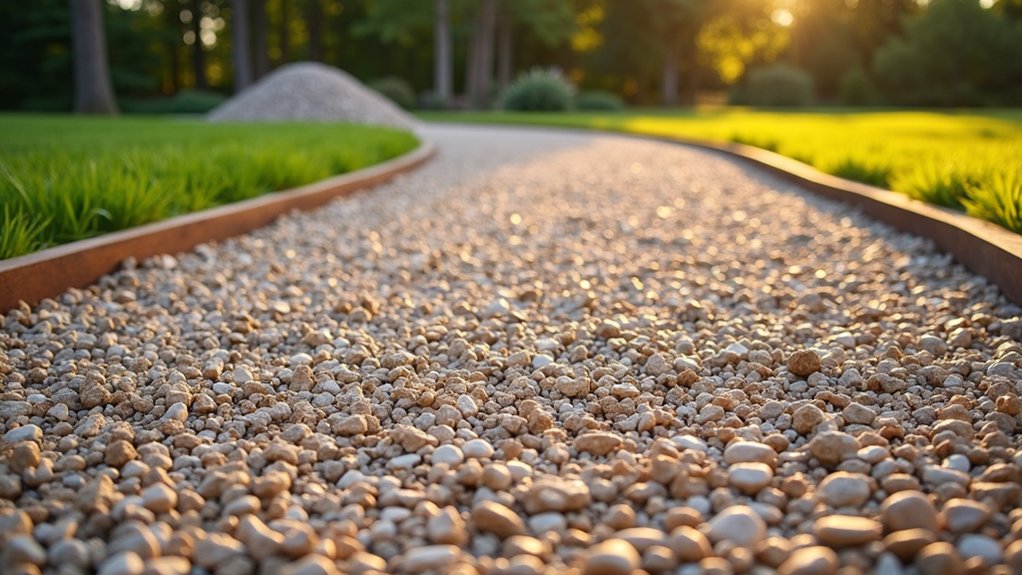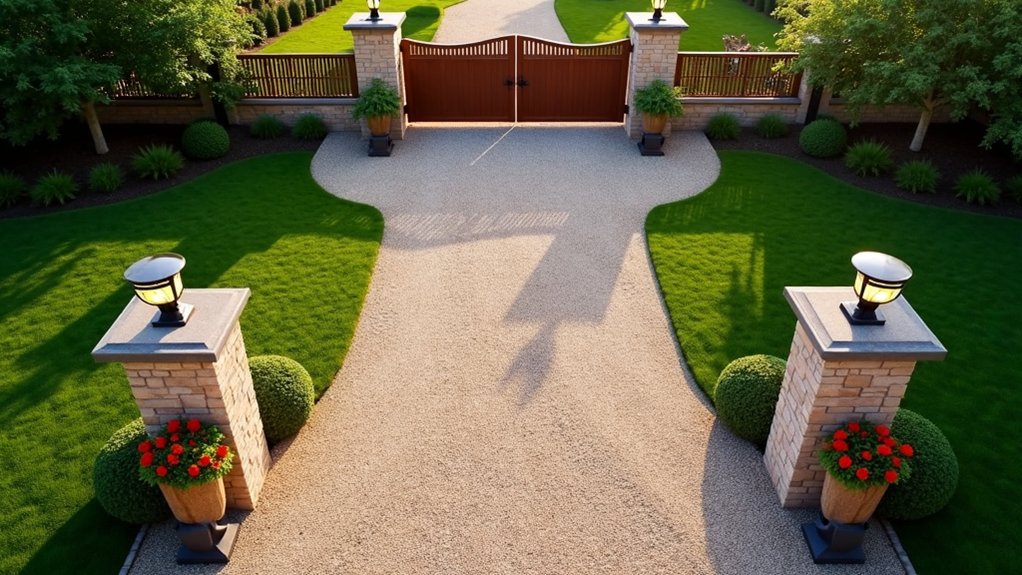A gravel driveway typically does not enhance property value, particularly in areas where paved driveways are the norm. In fact, it may detract from your home’s appeal, potentially resulting in longer selling times and lower offers. Many buyers view gravel as a sign of neglect compared to the neat appearance of paved options. To maximise your property value and attract prospective buyers, it’s crucial to choose the right driveway material. Consider how different driveway types can affect your home’s worth.
Table of Contents
ToggleKey Takeaways
- Gravel driveways tend to be less desirable in urban areas, which can lower property values compared to the paved driveways that are typically expected in such neighbourhoods.
- Although gravel driveways are generally cheaper to install, they often require more upkeep, which can impact their long-term value.
- Homes with paved driveways usually sell more quickly and at higher prices, suggesting that gravel driveways might limit market appeal.
- Curb appeal plays a crucial role in how buyers perceive a property, and a gravel driveway might give the impression of neglect, detracting from the overall attractiveness.
- In areas where gravel driveways are the norm, they may be acceptable, but overall, paved driveways are more likely to enhance property values.
Understanding Property Value and Curb Appeal
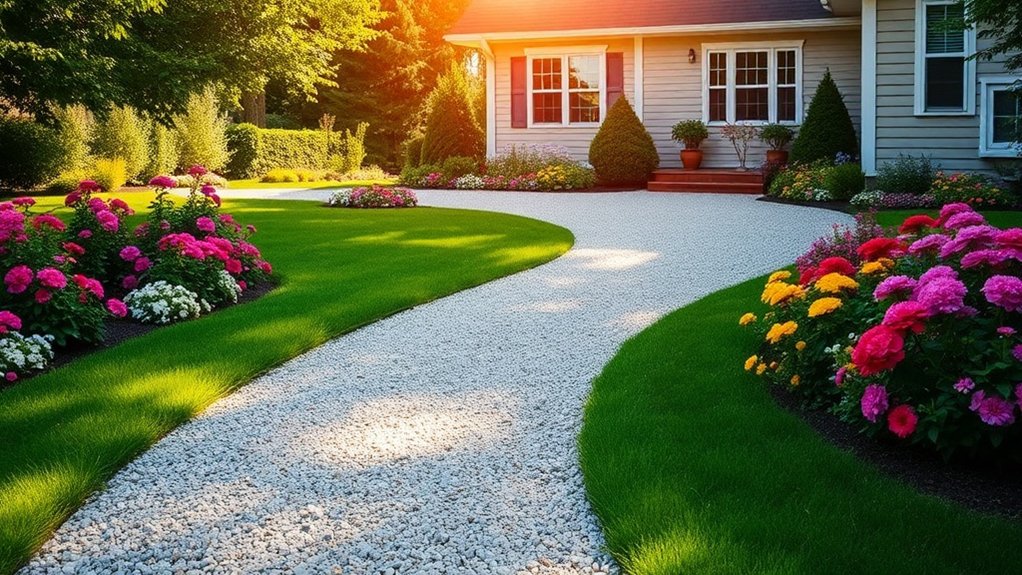
When assessing your property’s value, curb appeal is crucial in shaping buyers’ perceptions and influencing your home’s market worth.
Good curb appeal can enhance your property’s aesthetics, potentially allowing homes to sell for approximately 7% more than similar properties without it. Improving your exterior can increase your home’s market value by up to 10%. Additionally, homes with strong curb appeal command higher prices, making them more competitive in the market.
Buyers often link well-maintained exteriors with cared-for interiors, which reduces perceived risk and makes them more willing to pay.
Furthermore, quality landscaping can boost value by up to 12.7%. Investing in curb appeal not only improves your property’s visual charm but also offers substantial returns, making it a smart approach to maximise your home’s worth in any market.
The Cost-Effectiveness of Gravel Driveways
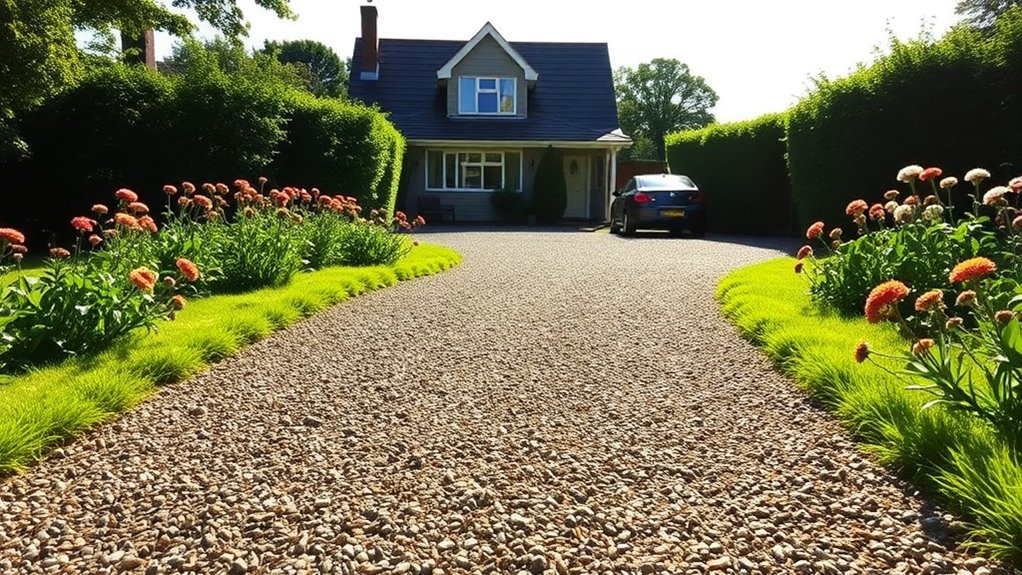
Curb appeal significantly impacts property value, and one of the most cost-effective ways to enhance your home’s exterior is by installing a gravel driveway. The initial installation cost is much lower than that of asphalt or concrete, making it a wise choice for homeowners on a budget. Additionally, a 1/4 mile gravel driveway is practical for properties with long access roads and offers excellent drainage properties, reducing the risk of standing water.
| Cost Factor | Gravel Driveways |
|---|---|
| Installation Cost | £1 – £3 per sq ft |
| Typical Driveway Cost | £4,000 – £6,000 |
| Maintenance Needs | Periodic replenishment |
| DIY Savings | Up to 50% on labour |
Choosing different types of gravel and using proper installation techniques can maximise your investment. While some maintenance is required, the overall cost-effectiveness of gravel driveways makes them an appealing option to enhance your property’s look without overspending.
Comparative Value of Gravel vs. Paved Driveways
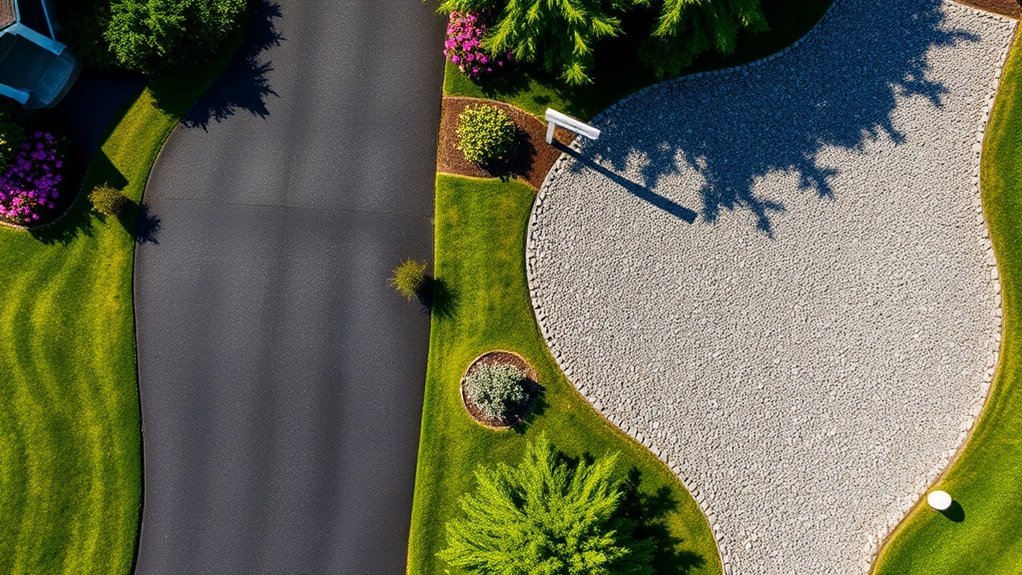
When comparing the value of gravel and paved driveways, it’s important to assess their cost-effectiveness alongside the potential increase in property value that comes with paving.
Paved driveways can significantly boost your home’s curb appeal and are often more in line with local standards, which can positively influence resale value. For instance, if you live in an area where most homes have tarmac or block paving, a gravel driveway may detract from your property’s appeal. Additionally, homes with paved driveways sell 7–10 days faster than those with gravel or dirt, and tarmac driveways are known for their durability and low maintenance, making them a preferred choice in many neighborhoods.
Cost-Effectiveness of Gravel
Gravel driveways are often the most cost-effective option for homeowners, but their long-term value can differ significantly from paved alternatives. Here’s a straightforward comparison:
- Initial Costs: Gravel typically costs between £1 and £3 per square foot, while asphalt ranges from £2 to £6, and concrete can go from £5 to over £12.
- Maintenance Needs: Gravel requires regular topping up and grading, which can increase costs over time.
- Ease of Installation: Installing gravel is simpler and needs less specialised equipment, which can lower initial labour expenses.
- Durability Considerations: Although gravel is cheaper upfront, its vulnerability to erosion may lead to higher overall lifecycle costs. Additionally, gravel’s long lifespan can make it a more appealing option for those looking to balance initial savings with future maintenance.
Consider these factors carefully to determine if gravel is the best option for your property.
Value Addition Through Paving
While gravel driveways might seem like a cost-effective choice at first, investing in a paved driveway can significantly boost your property’s value and appeal.
Paved driveways enhance the overall appearance and can increase perceived home value by up to 10%. They tend to sell faster—often 7 to 10 days sooner—due to their greater appeal to buyers, particularly in urban areas where move-in readiness is a priority.
Additionally, paved surfaces require less maintenance, making your home more attractive to potential buyers. On resale, you could see a return on investment of 50–75%. Furthermore, high-quality materials like block paving can further enhance curb appeal and attract buyers.
If you’re thinking about selling, choosing a paved driveway can give your property a distinct edge in the market.
Neighborhood Standards Impact
Neighbourhood standards significantly influence the value of driveways, especially when comparing gravel to paved surfaces.
If you’re assessing your driveway’s effect on your property’s desirability, consider the following:
- Curb Appeal: The material of your driveway shapes 72% of potential buyers’ first impressions and can affect perceived value by as much as 10%.
- Marketability: Paved driveways are more appealing to buyers because they require less maintenance and offer better usability.
- Neighbourhood Aesthetics: In areas where paved surfaces are the norm, a gravel driveway may decrease your home’s value.
- Appraisal Impact: Properties with paved driveways typically sell 7–10 days quicker than those with gravel.
In neighbourhoods where paved driveways prevail, matching local standards can boost your property’s attractiveness and market value.
Neighborhood Norms and Their Impact on Value
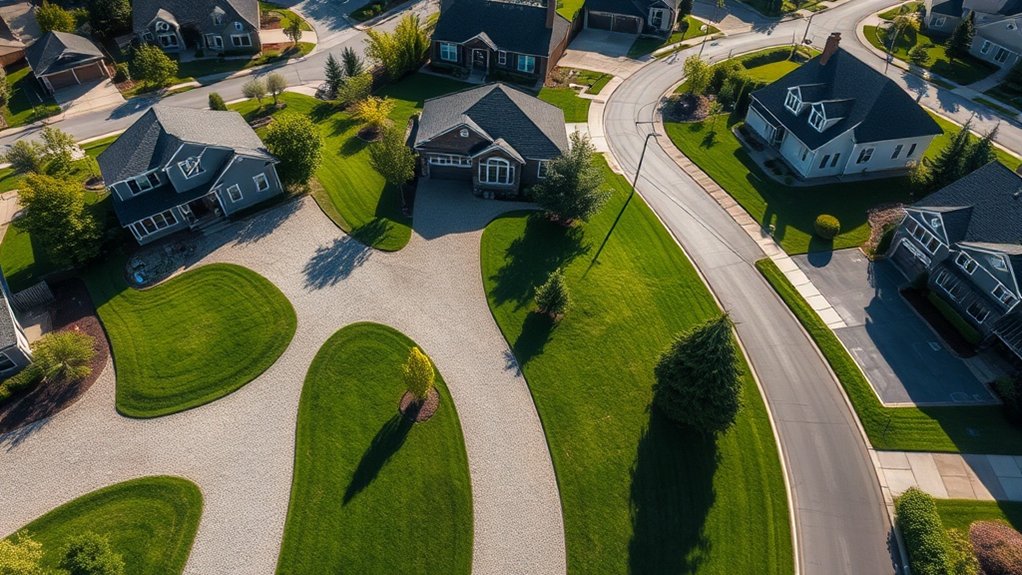
When buyers assess a property, they often look at how well it fits in with the local neighbourhood norms, particularly regarding exterior features such as driveways.
Consistency in the appearance of homes significantly influences their desirability. If your home has a gravel driveway while others are paved, it could put off potential buyers who prefer uniformity and cohesion.
Many community associations enforce rules about such materials to maintain this aesthetic consistency, which can help stabilise or even increase property values.
Buyers usually compare your driveway with those nearby, and any discrepancies can create negative impressions.
Ultimately, conforming to neighbourhood standards not only boosts your home’s appeal but also ensures it attracts a wider range of buyers, helping to protect its value.
Regional Considerations for Driveway Materials
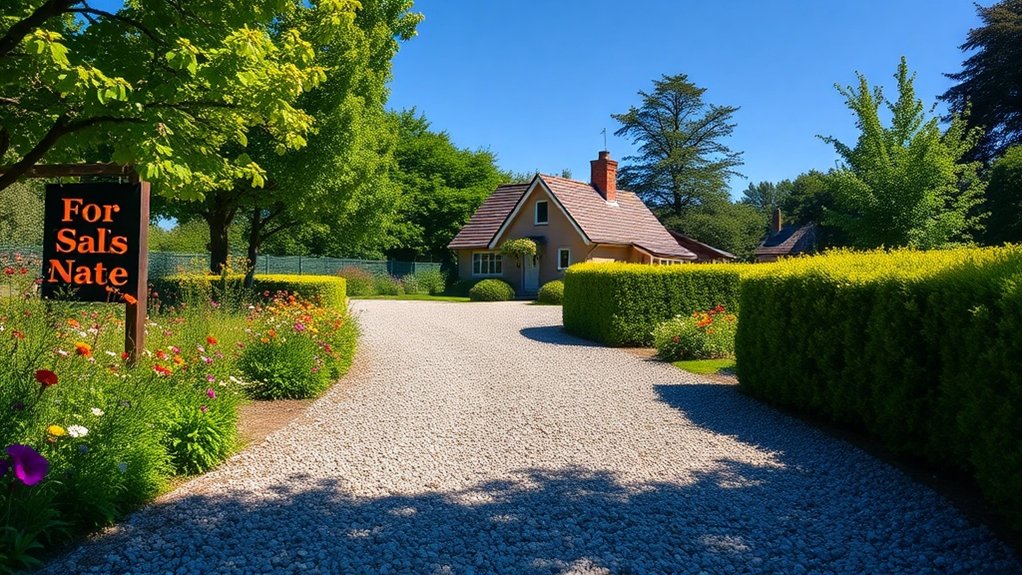
When choosing driveway materials for your property, consider the regional factors that affect their suitability and appeal. Here are some important points:
- Regional Climate: Gravel is great for wet areas as it allows for good drainage. In colder regions, it adapts well during freeze-thaw cycles.
- Material Availability: Using locally sourced gravel can reduce installation costs, making it a cost-effective option in rural areas.
- Buyer Preferences: In urban settings, paved driveways are often expected, which can affect property value. Conversely, gravel is generally accepted in rural locations.
- Cost Efficiency: Gravel installation costs range from £10 to £30 per square metre, making it typically cheaper than asphalt or concrete.
Maintenance Requirements for Gravel Driveways

To keep your gravel driveway in top condition, regular maintenance is crucial.
Replenish the gravel every 1-3 years to maintain its depth and durability. Regular grading is also important to prevent ruts and uneven surfaces.
Regular Replenishing Needs
Regularly replenishing your gravel driveway is vital for keeping it functional and looking good, as both traffic and weather can quickly wear it down.
Here are some key points to consider:
- Replenishing Frequency: For light usage, top up your gravel every 1-2 years; if you have heavy traffic, check annually.
- Gravel Type: Use angular crushed stone to reduce movement and prolong the lifespan of your driveway.
- Ideal Depth: Aim for a gravel depth of 3-4 inches for optimal performance.
- Weather Checks: After heavy rain or storms, inspect for any washouts and replenish as necessary.
Leveling and Maintenance Tips
Maintaining a gravel driveway requires regular attention to ensure it remains functional and visually appealing. Use effective techniques like frequent grading, particularly after heavy rain, to prevent ruts and ensure proper drainage.
Create a maintenance schedule that includes checking for winter damage, such as potholes and bare patches. Use robust rakes to clear the surface, removing debris that can obstruct drainage.
Compaction is crucial; compact any newly added gravel to improve durability and reduce erosion. Additionally, keep weeds under control and maintain clear edges to uphold your driveway’s structure.
Long-Term Value Implications of Driveway Choices
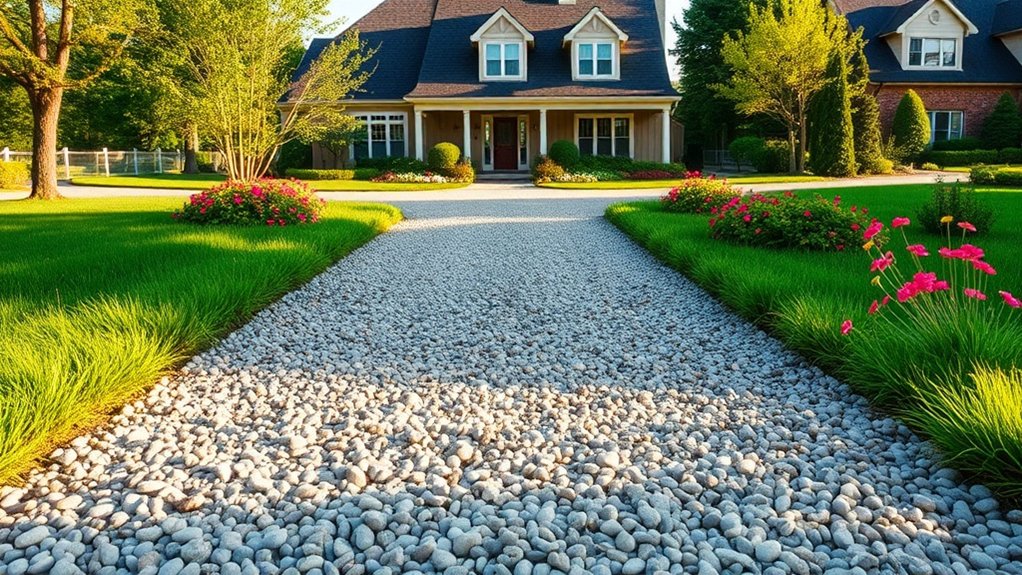
Choosing the right driveway material may seem like a small decision, but it can significantly affect your property’s long-term value. Here are some important points to consider:
- Cost Efficiency: While gravel might appear cheaper initially, its aesthetic appeal often falls short compared to paved options.
- Maintenance Requirements: Gravel driveways need regular upkeep, which can diminish their long-term value when compared to more durable surfaces.
- Longevity Concerns: Gravel generally has a shorter lifespan, which could lead to depreciation over time.
- Market Expectations: In areas where most homes feature paved driveways, a gravel option may lower your property’s attractiveness to potential buyers.
Buyer Perception and First Impressions
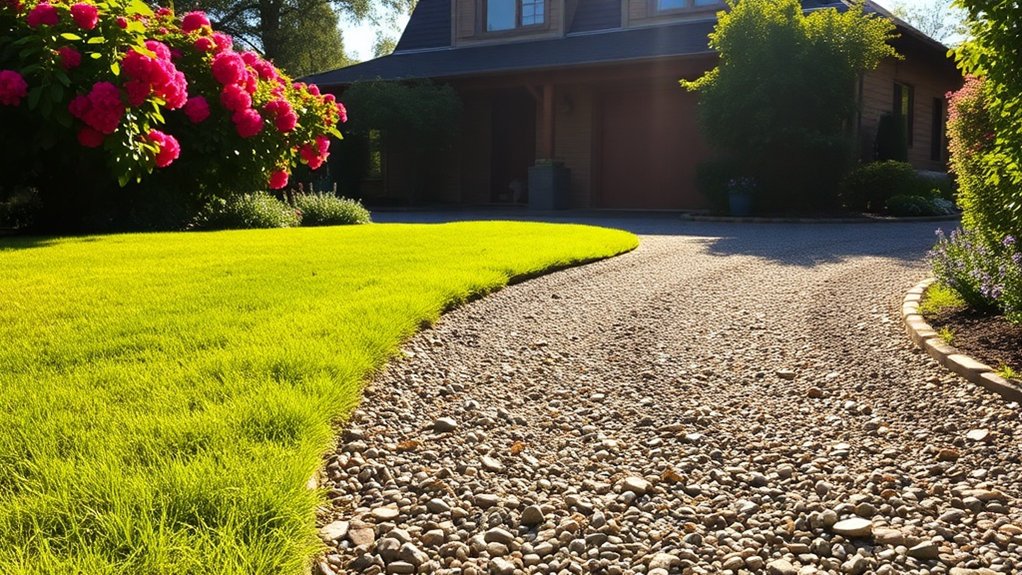
When potential buyers visit your property, first impressions are crucial; 72% of them form their opinion based on curb appeal.
A well-kept driveway not only improves that initial view but also suggests lower maintenance and move-in readiness.
If your gravel driveway is cracked or poorly maintained, it could put buyers off before they even enter your home.
First Impressions Matter
A well-maintained driveway is the first thing potential buyers see, setting the tone for their impression of your property. Here are some key points to consider:
- First Impressions Matter: A tidy, well-kept driveway signals a home that has been cared for.
- Aesthetics Count: An immaculate driveway boosts your property’s curb appeal, making it more inviting.
- Condition Affects Confidence: Any visible damage can raise doubts about the overall upkeep of the home.
- Material Preference: Paved driveways are often favoured over gravel, particularly in urban areas.
Investing in your driveway can significantly influence buyer perception, potentially increasing your property’s value by as much as 10%.
Curb Appeal Influence
Curb appeal is vital in shaping buyer perceptions, as it influences their initial impression of your property. Gravel driveways may attract certain buyers, especially in rural areas, but in neighbourhoods with predominantly paved driveways, gravel can appear less appealing and suggest neglect.
| Aspect | Gravel Driveways | Paved Driveways |
|---|---|---|
| Curb Appeal | Natural but less refined | Clean and sophisticated |
| Maintenance | Higher upkeep | Low maintenance |
| Buyer Perception | Budget-friendly, rustic | Modern and desirable |
While gravel might suit some styles, it often lacks the wider appeal required to enhance property value in competitive markets.
Practical Benefits of Paved Driveways
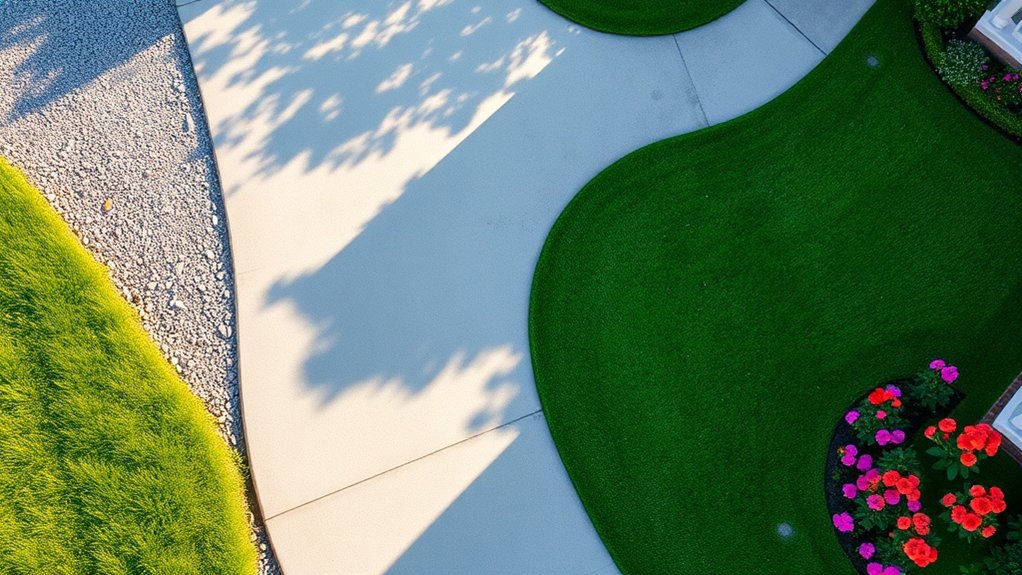
When choosing a driveway, the practical benefits of paved surfaces are hard to ignore.
Here are four main advantages of paved driveways:
- Durability: Both concrete and tarmac can last 20 to 30 years with minimal repairs, far outlasting gravel.
- Low Maintenance: Paved driveways require less upkeep, making snow removal straightforward and eliminating the need for regular replenishment.
- Visual Appeal: A paved driveway provides a neat finish that boosts curb appeal and suits various home styles.
- Weather Resistance: Paved surfaces hold up well against heavy traffic and harsh conditions, maintaining their quality better than gravel.
Enhancing Property Value With Driveway Features
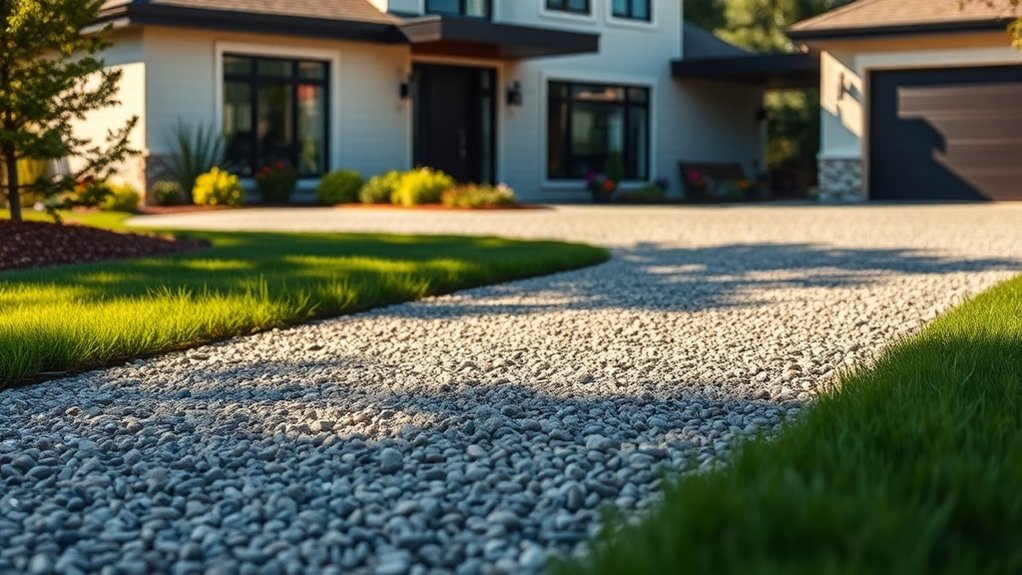
Investing in driveway features can significantly boost your property’s value, making it more attractive to potential buyers. A well-kept driveway can increase perceived home value by as much as 10%.
Adding landscaping edges with materials like bricks or stones enhances the look of your driveway, creating an inviting atmosphere that appeals to buyers.
Wider, level driveways not only offer better parking options but also suggest low maintenance, making them more appealing. A clean, crack-free surface improves curb appeal, often leading to quicker sales.
In areas where paved driveways are common, opting for one can provide a return on investment of 50–75%, helping your home stand out in the market.
Invest wisely, and see your property’s value grow.
Frequently Asked Questions
Can a Gravel Driveway Affect My Home Insurance Rates?
Yes, a gravel driveway can impact your home insurance rates. If the driveway is poorly maintained, it could lead to higher premiums. On the other hand, a well-kept gravel driveway may lower your insurance costs, as it reduces risk assessments from insurers. For instance, a tidy driveway lessens the chance of accidents, which insurers take into account when calculating rates.
How Do Local Regulations Impact Gravel Driveway Installations?
Local regulations can complicate the installation of gravel driveways. Zoning laws dictate where you can place your driveway and what materials you can use. Obtaining the necessary installation permits is essential for compliance. Ignoring these regulations could result in hefty fines and may affect both the functionality and appearance of your driveway. For instance, if your driveway encroaches on public land or doesn’t meet local drainage requirements, you could face issues down the line.
What Is the Lifespan of a Gravel Driveway Compared to Paved?
A gravel driveway can last for many years with proper maintenance, usually around 10-15 years. While maintenance costs are generally lower than those for paved driveways, gravel requires regular upkeep to prevent erosion and movement. For example, you might need to top up the gravel every few years to keep it looking tidy and functional.
Can Landscaping Around a Gravel Driveway Enhance Property Value?
Yes, good landscaping around your gravel driveway can significantly enhance the look of your property. Features like neatly trimmed hedges, colourful flower beds, and strategically placed trees can improve curb appeal. This not only makes your home more attractive to potential buyers but can also increase its value. A well-presented garden creates a welcoming atmosphere that many prospective buyers find appealing.
Is It Possible to Convert a Gravel Driveway to Paved Later?
Yes, you can convert a gravel driveway to a paved one later on. While gravel may seem low-maintenance now, considering paving options from the outset could save you hassle and improve your property’s appeal in the future. For example, a paved driveway can enhance aesthetics and provide a smoother surface for vehicles, making it a worthwhile investment.
Conclusion
In the end, opting for a gravel driveway is akin to planting a wildflower garden—visually appealing and easy to maintain, but it may not suit everyone’s taste. While it’s a cost-effective choice that can boost curb appeal, it’s important to consider the standards of your neighbourhood and the preferences of potential buyers. A well-positioned gravel driveway can add character, but if most of your neighbours favour paved driveways, it could detract from your property’s appeal. Ultimately, think carefully about your options to ensure your driveway enhances your home’s value and appeals to the right buyers.
Find out how tarmac driveways can enhance your home's value and attract buyers, yet the real impact may surprise you.
How to enhance your gravel driveway's stability and durability? Discover key strategies that can transform your drive into a long-lasting Read more
Get ready to transform your driveway into a luxurious space without breaking the bank—discover simple tips that will elevate your Read more

